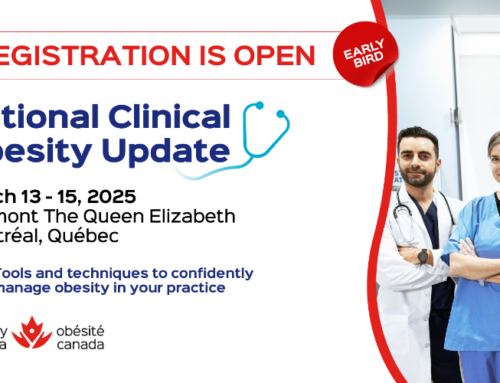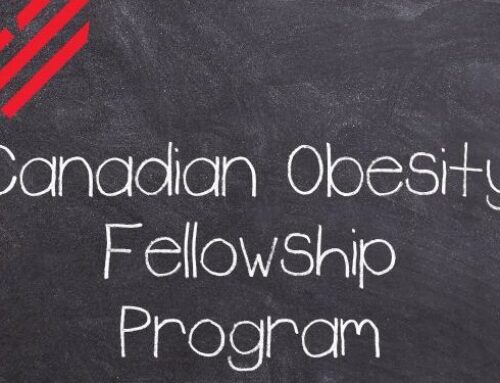Today’s blog is written by Jennifer Brown, Registered Dietitian at The Ottawa Hospital Bariatric Centre of Excellence.
Since 2021, the University of Ottawa Heart Institute (UOHI) has been transforming clinical practice, staff education, and patient-care to be aligned with the key messages of the 2020 Canadian Adult Obesity Clinical Practice Guidelines (CPGs). The CPGs were the first patient-centered guidelines to address weight bias/stigma for adults living with obesity and a pioneer in shifting the narrative of obesity to focus on health-based outcomes instead of weight or Body Mass Index (BMI) (read here and here for more highlights of the CPGs). The UOHI has been one of the first organizations across Canada to implement the CPGs into clinical practice (read here for more background).
On October 5, 2023, a cohort of healthcare professionals, primarily nursing and allied health providers from the UOHI took part in the UOHI Obesity Champion Training Day to become ‘obesity champions.’ This training day featured insights from 10 speakers, who addressed critical aspects of obesity care, ranging from the lived experiences of individuals with obesity and heart disease, the intricate physiology of weight and appetite regulation, evidenced-based treatments, and strategies to reduce weight bias and stigma. The Champions were provided with an online Introduction to Obesity education course prior to the training day, along with resources, videos, handouts and scripts to practice in role playing sessions, and extensive opportunities to ask questions and learn from others. This multidisciplinary gathering underscored the commitment of healthcare professionals to become advocates for evidence-based obesity care.
Key Topics Covered:
Lived Experiences:
Insightful narratives of former patients at the heart institute that live with obesity and heart disease set the foundation for the day and framed the objectives of reducing weight bias and stigma, understanding obesity as a chronic disease, and changing the narrative about obesity using the 2020 Canadian Obesity Clinical Practice Guidelines.
Incorporating the 5As of Obesity Care into Cardiac Rehab:
Obesity Canada’s 5As of Obesity Care were showcased to participants with emphasis towards the first three A’s: Ask, Assess, Advise, Agree, and Assist. The 5As framework is an easy-to-use roadmap that ensures sensitive, realistic, measurable, and sustainable obesity management strategies that focus on improving health and well-being, rather than simply aiming for numbers on a scale.
Physiology of Weight and Appetite:
Champions delved into the intricate science behind weight and appetite, gaining a deeper understanding of the physiological aspects of obesity. From regions in the brain that control weight, to hormones and pathways that respond to appetite markers and defend against weight loss. Champions were amazed by the complexity of obesity and that it’s not all about ‘eating less and moving more’.
3 Pillars of Obesity Treatment:
Management of obesity has traditionally been viewed through the simplest lens of “eating less and moving more”, which doesn’t target the biology or physiology of obesity. It also perpetuates the bias that exists around weight, food, and movement. Participants unlearned this old philosophy and relearned the evidence that there are 3 pillars to treatment; psychological (behaviour therapies), pharmacological (medications) and surgical (metabolic/bariatric surgery). Each pillar supports individualized Medical Nutrition Therapy and Physical Activity as fundamental components of obesity care.
Practice/Breakout Sessions – Role Playing and Scripts:
The inaugural “Train-the-Trainer” day provided hands-on learning through role-playing scenarios, resources, videos and pamphlets for champions to disseminate their newfound knowledge and skills within the heart institute. Patients, visitors, and staff can now access a wealth of online tools and resources to enhance their understanding of obesity through the UOHI website: Obesity Education and Resources.
The success of the UOHI Obesity Champion Training Day was made possible by the dedicated UOHI obesity guideline committee. A special thank you to Novo Nordisk for sponsoring the trainees’ lunch and to Obesity Canada for collaborating on the resources and supporting expertise on the content and messaging aligned with the CPGs.
This event marked a pivotal moment in healthcare, whereby evidence-based guidelines were implemented to make a difference in the care that patients and family members receive at the UOHI. This passionate group of champions are now armed with knowledge, empathy, and practical skills to educate and support staff at the UOHI to make a significant impact on patient care, reducing stigma, and promoting evidence-based obesity care in practice.
Key Messages
- Obesity is a chronic disease, not a lifestyle choice
- Obesity is characterized by having abnormal or excess body fat that impairs health
- Not all individuals with larger bodies or higher body weights have the disease of obesity
- Avoid providing messages to “eat less and move more”
- Evidence based treatment exists for individuals living with obesity
- Behaviour therapies
- Pharmacological interventions
- Surgical interventions
- All three treatments support individualized nutrition and physical activity needs
- Weight loss is not a behaviour. Weight loss is an outcome.
- Eating well, staying active, getting good sleep, and managing stress will support heart health, regardless of weight changes.
- Healthcare providers should:
- Assess their own biases regarding weight
- Make sure clinic settings and environments are safe and inclusive to all body sizes and weights
- Change the narrative of obesity away from a ‘lifestyle choice’
- Provide dignity, respect, and access to care, including treatment and management of obesity that is evidence-based
Refer to the CPGs for evidence-based recommendations and key messages for all 19 chapters: https://obesitycanada.ca/guidelines/chapters/





